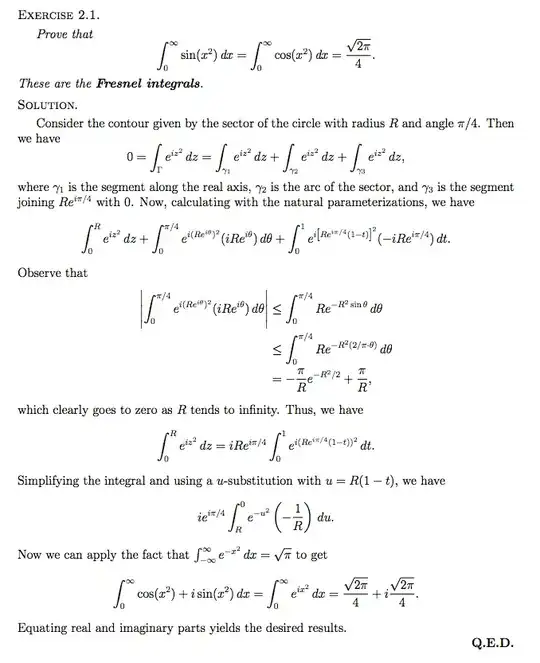There's a typo in their parametrization of $\gamma_3$. They have $dz = (-iRe^{i \frac{\pi}{4}}) dt$ instead of $dz = (-Re^{i \frac{\pi}{4}}) dt$. With this correction, their line after showing that the integral over $\gamma_2$ drops out should read: $$\lim_{R\rightarrow \infty} \int_0^R e^{iz^2} dz = \lim_{R\rightarrow \infty} R e^{i \pi/4} \int_0^1 e^{i(Re^{i \pi/4}(1-t))^2} dt. \quad\quad\quad (*)$$
Now, if we do their $u$-substitution, the right hand side becomes \begin{align*}\lim_{R \rightarrow \infty} R e^{i\pi/4} \int_R^0 e^{-u^2} \frac{-1}{R} du &= \lim_{R\rightarrow \infty} R e^{i\pi/4} \int_0^R e^{-u^2} \frac{1}{R} du\\ &= \lim_{R \rightarrow \infty} e^{i \pi/4} \int_0^R e^{-u^2} du\\ &= e^{i\pi/4} \int_0^\infty e^{-u^2} du\\&=e^{i\pi/4}\frac{\sqrt{\pi}}{2},\end{align*}
where the last equality follows from the fact that $e^{-u^2}$ is even and so $$\int_0^\infty e^{-u^2} du = \frac{1}{2}\int_{-\infty}^\infty e^{-u^2} du = \frac{1}{2} \sqrt{\pi}.$$
Combining this result with $(*)$, we have $$\int_0^\infty e^{iz^2} dz = e^{i\pi/4}\frac{\sqrt{\pi}}{2} = \frac{\sqrt{2\pi}}{4}+ i \frac{\sqrt{2\pi}}{4}.$$
